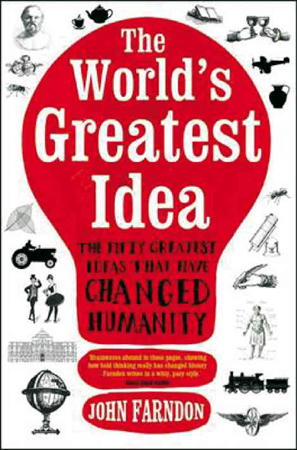Arm yourself with a treasure trove of ideas!

On business and “hard” subjects, we wrote about financial shenanigans, taking back the boardroom, negotiation, execution, guide for business consultants, training, the attention economy, social research and many more.
The point is the Executive must be “liberally educated,” not through formal academic work but, at least, through social interaction and reading books that make him a Renaissance man—a guy with many interests, from the sciences to the arts, from the profane to the profound, from the trivial to the sublime. Why? Because, it has been said many times that the “liberally educated executive” makes a better CEO than those confined to their own disciplines.
So, once in a rare while, we review a book that simply strikes as one that will expand the boundaries of the Executive’s interest. The book “The World Greatest Idea” is one such book. Sub-titled “The Fifty Greatest Ideas That Have Changed Humanity,” the book delivers what it has promised.
“Ideas matter,” says the author. They shape our experience of the world. They bring us good things and bad. They alter our lives for better or worse.” His and his panel’s selection is based, not on the greatest good that the idea spawned, but the greatest impact that it has made. They earlier conducted a poll on which one has the greatest impact, and the Internet emerged number one.
May I warn the reader that the top choices begin from the back of the book and progressing to the front cover. For example, the Internet, number one in the list, is discussed on page 310 in a 320-page book. On this, the author says: “No technology has ever had such a profound and instant impact on so many people as the Internet,” the author says. “Some 2 billion people, a third of the world’s population, already use the Internet,” and growing.
In the Philippines alone, the Internet has developed much faster than our existing laws. And when our laws try to catch up with a 21st century reality that runs with the speed of light, we can only come with a “cybercrime law,” curtailing freedom.
It is a case of a 19th century mind-set of curtailing freedom using a 21st century technology that is premised on liberty, free flow of information. Well, this is the beauty of this book. It introduces a subject, one great idea in the world, and it provokes thinking and debate.
Number two in the list is “writing,” and the author has this to say about this idea: “The discovery of writing (I think it is more invention than discovery) was the most significant watershed in human history. It made history possible.”
Man speaking to man, even God speaking to man (in the Judeo-Christian Scriptures and other writings of whatever faith) made possible the handing down of an earlier generation’s experience with much later generations.
Interestingly enough, “contraception” emerged as the number three choice among the greatest ideas. The author has introduced it with this simple statement: “Sex without consequences.” And thankfully enough, music has materialized as number four among the top picks. Farndon begins discussing it with a sound bite: “Music is the soundtrack of our lives.”
And then he introduces a thought that provokes: “Music is such an integral part of our lives that it is perhaps wrong to call it an idea.” It is good that he admits that some in his list have actually come in with the birth of humankind. We can say the same thing about “honor” and “hope”—both of which are discussed as if they were inventions. This is debatable because “hope,” for example, has been inherent in the individual and that truth is stated wondrously in a popular line, “Hope springs eternal in the human breast.”
And “honor”? It is a built-in element in the person whose sense of self-worth and dignity makes him/her value integrity and identity. Anyway, dear readers, this is the entire point of this book, as the author alternately calls his opus as “absurd,” “beguiling”—or something that seduces or triggers a never-ending argument.
Also interestingly, “marriage” placed number 50 among the choices—and it explains the ambivalence of many people—in the past and in the present—about the value of marriage. To many who are Christians or Muslims or those who embrace other faiths, marriage is a precious institution. And yet, true to his purpose to provoke debate, the author quotes Groucho Marx who has this to say about marriage: “Marriage is a great institution, but who wants to live in an institution?”
Mercifully, Farndon gives the revelation that many societies still believe in marriage as a stabilizing force, as an assurance of children’s legitimacy and as an insurance in case of old age.
What about wine? It is number 34 in the list. To trigger a debate, the author quotes Victor Hugo: “God made only water, but man made wine.” To counter this, you can relate the first miracle of Jesus at a wedding in Cana where he turned water into wine!
From wine, Farndon turns to an idea that makes him waxing romantic—with these lines: “Softly, he touched her on the arm and pointed to the little wooden boat that fluttered gold on the water in the sun’s last rays. As she turned, she saw it was filled with red roses, and written clumsily on the side was her name in silver letters. ‘It’s yours,’ he said as her eyes brimmed with tears.” Corny, we say. Romance, Farndon says.
This book brings us back to the discovery or invention of great ideas that changed man and woman. When you read each subject, you are irresistibly drawn to the points and counterpoints raised by the author. In the end, you have more wealth of information than before. And, yes, you have a treasure trove for that next party—to provoke thought and debate, and hopefully, not a fisticuff dmv.communcations@gmail.com
